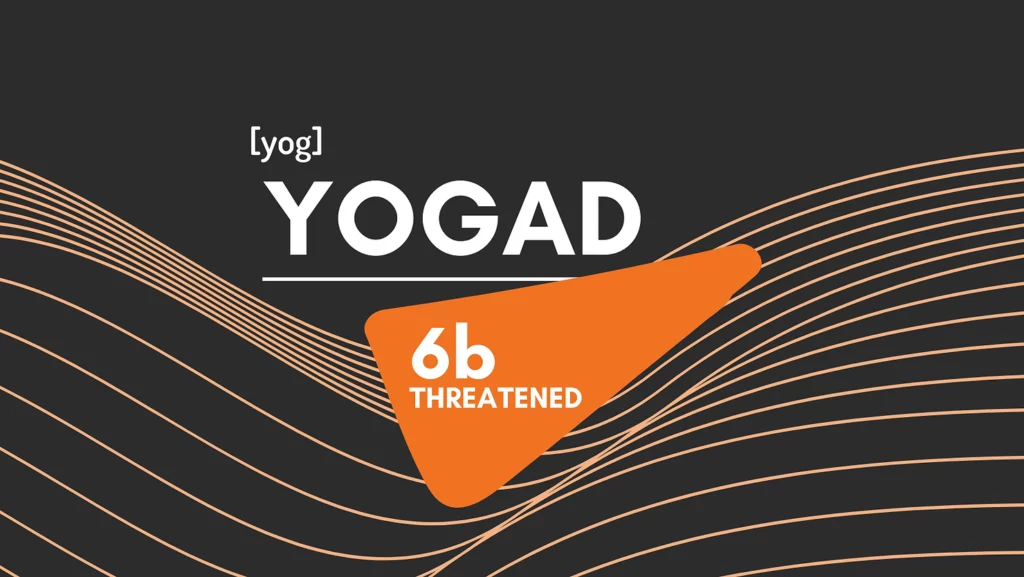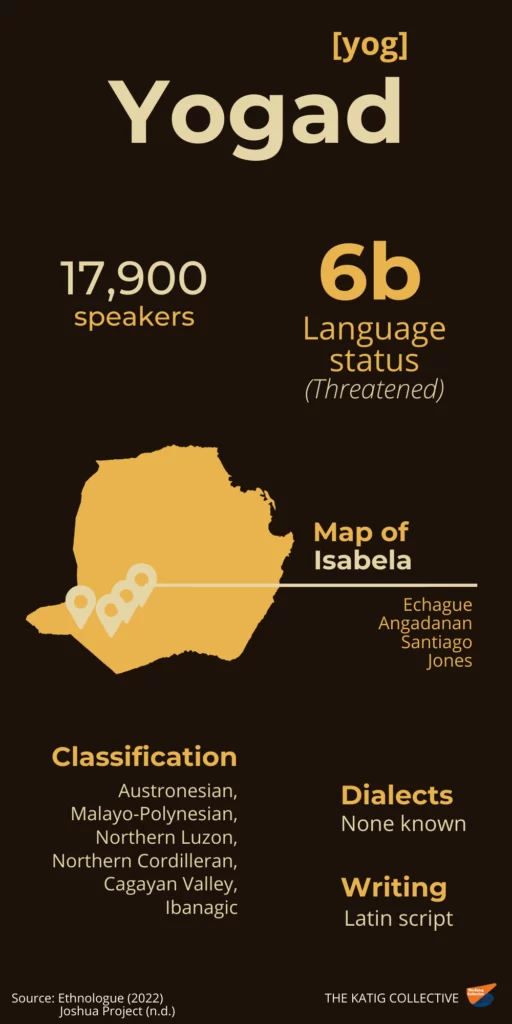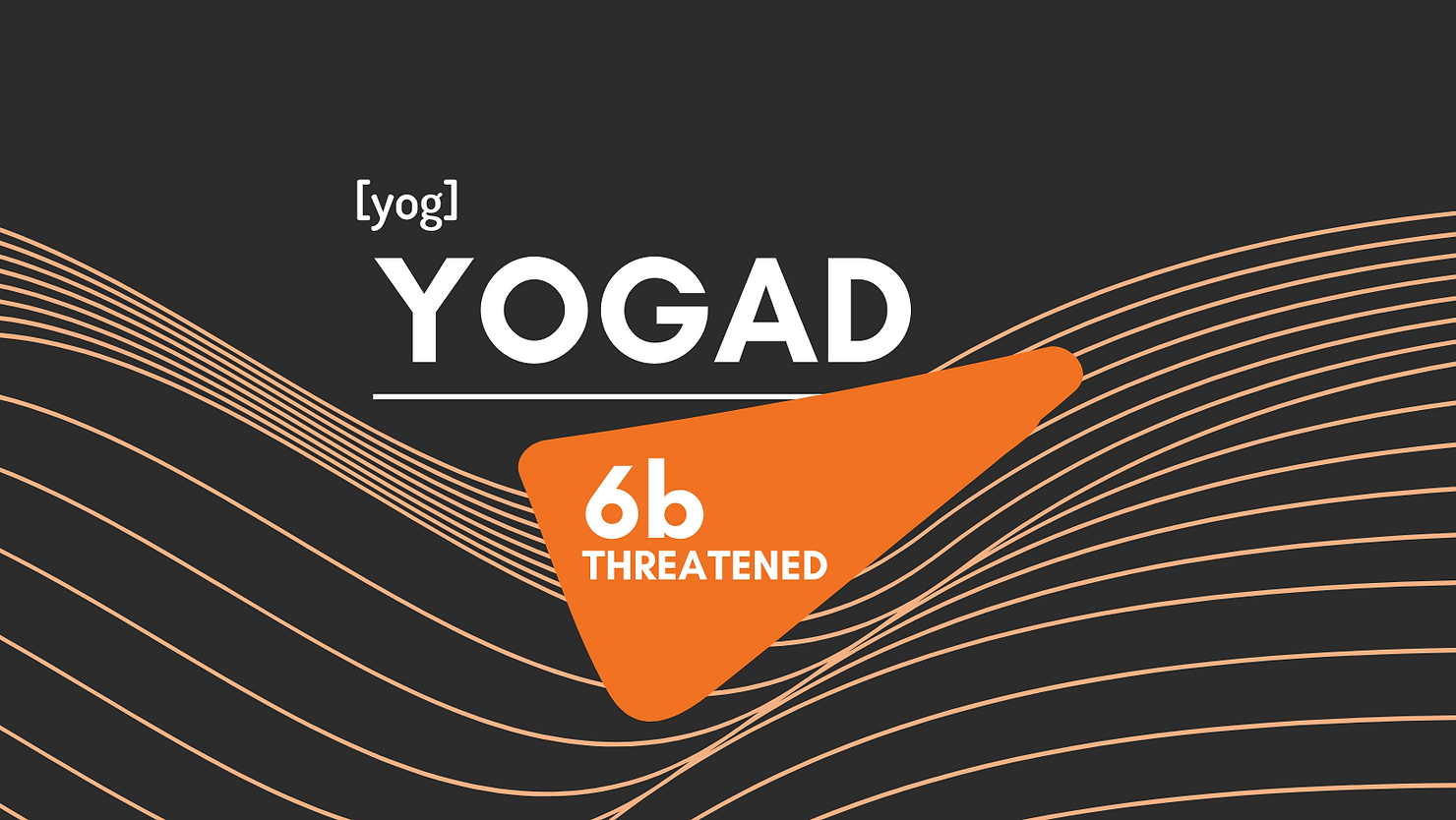Yogad
Yogad [yog] belongs to the Ibanagic subgroup of the North Cordilleran languages. It is spoken by an ethnolinguistic group primarily situated in Echague, Isabela, and has a user population of 17,900 (UNSD, 2005, as cited in Eberhard et al., 2022). Other Yogad speakers can be found in nearby municipalities such as Angadanan, Santiago, and Jones (Joshua Project, n.d.). The language has no known dialects and is considered threatened (EGIDS 6b). This information is supported by a survey indicating that only 23.7% of the population in Echague continue to speak Yogad (Philippine Statistics Authority, 2010; Manzolim & Quilang, 2015). Yogad speakers shift to Ilocano [ilo], the lingua franca of the area, as well as to Tagalog [tgl] and English [eng] due to their prestige and supposed economic value.

Various studies on the Yogad language and practices have been made in the past few years (Sabio, 2016; Ambrocio et al., 2017; Quirante, 2018). In addition, resources including songs, poems, and recipes can be found online. An article on a Yogad film festival shows local efforts to spread awareness of the language and propagate language use (Valiente, 2018). And as of writing, Yogad is yet to be institutionalized as a language of the Mother Tongue-Based Multilingual Education (MTB-MLE) program (Quirante, 2018).

References
Ambrocio, K., Binag, R. K., Cachola, R. J., Concepcion, R. A., Domingo, L., Lopez, J., Paguirigan, R. J., Santa Monica, J. B., & Visaya, C. G. (2017). The indigenous knowledge used by the Yogad people in utilizing medicinal plant at Echague, Isabela: An ethnobotanical study. Academia. https://www.academia.edu/35883446/THE_INDIGENOUS_KNOWLEDGE_USED_BY_YOGAD_PEOPLE_IN_UTILIZING_MEDICINAL_PLANT
Eberhard, D. M., Simons, G. F., & Fennig, C. D. (Eds.). (2022). Yogad. Ethnologue: Languages of the world (25th ed.). https://www.ethnologue.com/language/yog
Hammarström, H., Forkel, R., Haspelmath, M., & Bank, S. (Eds.). (2022). Spoken L1 language: Yogad. Glottolog 4.6. https://glottolog.org/resource/languoid/id/yoga1237
Heritage et. al. (2021, June 14). YOGAD language and rituals: The Andakit, boat healing ritual [Video]. Youtube. https://www.youtube.com/watch?v=94Dz8PNySGI
Joshua Project. (n.d.). Yogad in Philippines. https://joshuaproject.net/people_groups/16047/RP
Manzolim, H. A., & Quilang, L. L. (2015). Revisiting the traditional practices of Itawis ethnic families of Isabela, Philippines. Countryside Development Research Journal, 3(1), 28-42. https://cdrj.ssu.edu.ph/index.php/CDRJ/article/view/67
Open Language Archives Community. (n.d.). OLAC resources in and about the Yogad language. http://www.language-archives.org/language/yog
Philippine Statistics Authority. (2010). 2010 census of population and housing: Report no. 2A: Isabela. https://psa.gov.ph/sites/default/files/ISABELA_FINAL%20PDF.pdf
Quirante, C. (2018). The future of Yogad: An appreciative inquiry on mother tongue-based multilingual education classroom practices in the Philippines [Unpublished master’s thesis]. Carleton University. https://curve.carleton.ca/system/files/etd/d3466110-ec06-4602-ad7a-e96495b324b3/etd_pdf/a005dbd2e399f0a48c8530657c2f48ca/quirante-thefutureofyogadanappreciativeinquiryonmother_r.pdf
Sabio, D. G. S. (2016). Yogad folk songs of Echague: Reflections of life and of love. The Asian Conference on Literature and Librarianship 2016: Official conference proceedings. International Academic Forum. https://papers.iafor.org/submission21867/
Valiente, T. G. (2018, April 11). Filming the north: The Yogad film festival. Business Mirror. businessmirror.com.ph/2018/04/11/filming-the-north-the-yogad-film-festival/

